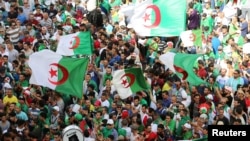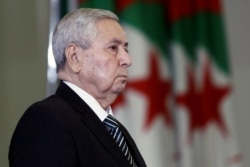Algerian interim president Abdelkader Bensalah has set up a six-member panel to oversee a national dialogue and hold a presidential election aimed at ending months of political crisis, the presidency said Thursday.
President Abdelaziz Bouteflika stepped down on April 2 after 20 years in power, under pressure from mass protests demanding the removal of the ruling elite and the prosecution of people suspected of corruption.
Authorities canceled a presidential election previously planned for July 4, citing a lack of candidates. No new date has been set.
The panel, led by former parliament speaker Karim Younes, also includes two experts in law, an economic expert and two politicians.
"The dialogue will cover all aspects related to the organization of this election, its necessary conditions ... and the date of the election," the statement quoted Bensalah as telling the panel at a meeting Thursday. "The dialogue must be inclusive of the whole political class, national figures and civil society."
The army is now the main player in Algerian politics, and its chief of staff, Lieutenant General Ahmed Gaed Salah, has repeatedly urged the opposition to cooperate in the holding of an election as soon as possible.
The panel will immediately start consultations with people willing to take part in the dialogue, the statement said.
"National dialogue remains the only way that can guarantee a peaceful outcome in line with what Algerians are expecting," Younes said. "We are aware of the national impasse in which we live."
Corruption investigations
In a bid to appease protesters, the judiciary has started corruption investigations involving several former senior officials.
Many prominent businessmen and ex-officials, including former prime ministers Ahmed Ouyahia and Abdelmalek Sellal, have been placed in custody on charges including "dissipation of public funds."
Protesters are now demanding the departure of Bensalah, a former head of the upper house of parliament, and Prime Minister Noureddine Bedoui, who are regarded by demonstrators as part of the old guard that has governed the North African country since independence from France in 1962.






